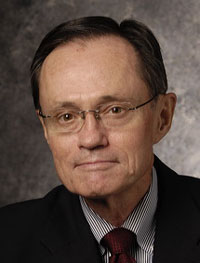Robin Lovin: The Currents of History
Robin Lovin, the Cary Maguire University Professor of Ethics at Southern Methodist University, writes about Obama and the nature of historical moments for NPR.
By Robin Lovin

In many ways, this is a strange time to speak of turning points and new days. We are deep in the middle of two wars and an economic crisis. Many of the policies that got us there are still in force, and we do not know how to replace them or undo their effects. The residual effects of discrimination and racial inequality, which are still very real, are only made worse by economic crisis, and they will probably long outlast the first African-American president, even if he wins a second term.
But history does not all move in the same direction at once or turn corners all at the same time. The distinguished Harvard church historian William R. Hutchison used to say that history is like a deep ocean with currents moving at several levels—short, choppy waves on the surface, steadier currents moving at greater depths, and great, slow movements at the bottom, beneath all the rest. At the mid-level, we are in a cold, fast current. The sobriety of President Obama’s challenge to our own responsibility and his grim warning to our enemies are evidence of that. In the depths, however, beyond the reach of policy, God makes history despite our intentions and beyond our understanding, and we sense that something has changed. All those ancestors whom President Obama mentioned, slaves and slaveholders, immigrants and Know-Nothings, Freedom Riders and Klansmen, built for us a world which we now share more completely than they ever hoped or feared we would.
Perhaps some trillions of dollars and several presidents from now, we will realize with equal astonishment that we have conquered the problems of economic insecurity and made peace with our enemies and with our planet, but that time is not now. Tomorrow morning, the first African-American president will take on the issues that he did talk about when he asked us to vote for him. We, too, should turn to those immediate problems, but we can do so with gratitude for a moment of insight into a deep change that has made us better people and a better nation.
# # #